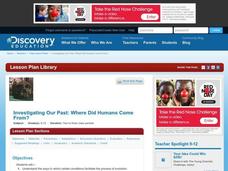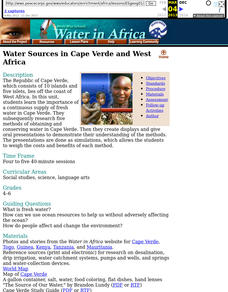Howard Hughes Medical Institute
Human Feet Are Strange
Feet are neat! So, if you've already walked the path of examining animal footprints with your class, put them in the shoes of early humans! A well-designed activity incorporates video, discussion, and hands-on learning to demonstrate how...
Curated OER
Investigating Our Past: Where Did Humans Come From?
Investigate the theories of human evolution. In this research based lesson, learners research and discuss how geographic isolation, interbreeding, generalization, and specialization are factors in the history of humans. Groups work...
Curated OER
The Earliest Humans
Study the wonder and science that leads us to our human past. From Darwin and Huxley's assertions regarding the origin of the species to the discoveries at Oldivi Gorge, this PowerPoint is sure to interest your class. They'll learn about...
Curated OER
Warm Up: When Modern Human Behavior Appeared in Early Hominids
Upper graders or entry college level learners use the provided article links to answer three questions regarding early modern human behavior. They compose short essay responses that accommodate each part of the overarching question,...
Curated OER
Water Sources in Cape Verde and West Africa
Young explorers study the scarcity and importance of a continuous supply of fresh water in Cape Verde. They research the five main ways that fresh water is obtained in these countries. Each research group prepares a presentation, and...
Howard Hughes Medical Institute
Human Impacts on Biodiversity
Have you always wanted to take your science class on an amazing field trip they will never forget? Now you can! Observe the wildlife in an African savanna through trail cameras with a five-part data analysis activity. Learners analyze...
Curated OER
Human Evolution: Biology, Bones
Learners will love a weeks worth of bone study. They use bones and characteristics of bones to explore the evolution of hominoids. Bones are compared, categorized, and considered. A great way to bring physical anthropology and material...
Howard Hughes Medical Institute
The Making of the Fittest: Natural Selection in Humans
Sickle cell disease only occurs when both parents contribute the trait, and mostly in those of African descent. Where did it come from? How did it evolve? Tony Allison, a molecular biologist, noticed a connection between sickle cell and...
Curated OER
Topography of Africa
Students study Africa's diverse landscape and investigate how these features impact the available water supply, food sources, and population distribution of the continent. They compare topographical features and
their affect on each...
Curated OER
Reaching Across Borders In Southern Africa
Students gain a greater understanding of how political borders impact human and environmental development. Then, either individually or as a class, establish a correspondence with a Peace Corps volunteer working in Africa.
Curated OER
A Comparison of Cloud Coverage Over Africa
Students use a NASA satellite data to contrast amounts of cloud coverage over different climate regions in Africa. They explore how Earth's major air circulations affect global weather patterns, and relate to local weather patterns.
Howard Hughes Medical Institute
Using DNA to Trace Human Migration
Can scientists trace all humans back to a small region in Africa? An intriguing lesson turns back time to reveal artifacts leading scientists to believe human life originated in Africa and dispersed from there.
Curated OER
Roots: The Ancestry of Modern People
High schoolers investigate the models for the origin of modern humans and the conditions that facilitate speciation and evolution. The classification and nomenclature of hominid species is also examined.
Curated OER
Elsa the Lioness
Elsa is a lioness who was raised by humans in the 1950's. The Adamsons took her in after George Adamson reluctantly killed her mother. Elsa did return to the wild but maintained a very strong bond with the Adamsons until her death in...
PBS
Ebola Outbreak
As of April, 2016, more than 28,000 suspected cases of Ebola were recorded in Western Africa with over 11,000 human deaths. Classes discuss the Ebola virus outbreak in 2014 and then groups develop an action plan based on...
Curated OER
How Different Authors Treat Similar Themes - Elephants of Africa
Students watch videos about similar themes presented by two different authors about elephants and their relationship with humans. In this theme analysis lesson, students watch video segments, visit the given websites, and complete...
Curated OER
Rainforest Rescue
Young scholars explore threats to diversity in the Central African rainforest. They use a guided website to research animals that are threatened with extinction, examine human uses of the rainforest and think about what they can do to...
Curated OER
Climate and Cultures of Africa
Students gain an understanding of the relationship between climate and culture in the sub- Saharan Africa. Students will complete short exercises pertaining to the various cultures of Africa and the climate in which they live....
Curated OER
The Real Eve
Students research about human migration during a specific time period. In this physical science instructional activity, students watch a video about human evolution. They prepare a presentation on human migration and share it with the...
Howard Hughes Medical Institute
Lesson 4: Gorongosa's Food Webs
Who eats who in the savannas of Africa? Explore trophic levels with part four of an eight-part series of lessons focused around Gorongosa National Park. After young explorers identify animals using trailcam images, they construct a food...
Curated OER
What is Deforestation?
An overview of deforestation is the focus of this resource, which present the reader with a list of facts. Ten comprehension questions follow; learners can write their answers on a separate piece of paper. Have your environmental...
Baylor College
We Need Water
There's nothing quite like a glass of ice-cold, freshly squeezed lemonade. Lesson seven of this series explains how the water humans need to survive can come in many forms. Teach your class about how much water humans require every day...
Pulitzer Center
Exploring Downstream: Water Resources
The lack of clean water is a life-threatening plight for millions of people around the world. Through an extensive WebQuest, young environment or social studies classes compare our water availability to that of the cxitizens of Ethiopia,...
Howard Hughes Medical Institute
Lesson 2: Gorongosa National Park
How has Gorongosa National Park changed over time? Discover the park's rich history, dating back to primitive human times, through an interactive timeline and scientific reading. The second installment in an eight-part series explores...























